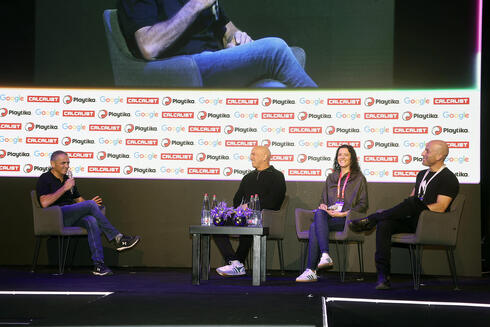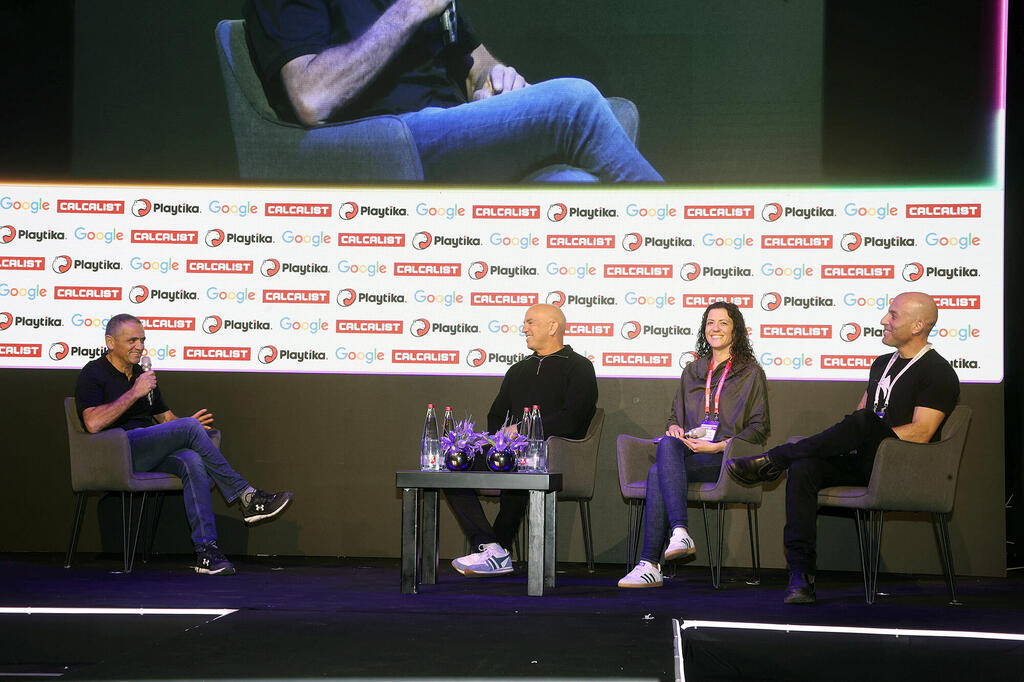
"People worry AI will replace them, but those who master it will thrive"
Keren Marom, co-founder of Beach Bum, was speaking in a panel held as part of Calcalist's gaming conference in collaboration with Google and Playtika. The panel also included: Schraga Mor, CEO of Plarium, and Uri Marchand, co-founder and CEO of Overwolf.
The gaming industry is evolving rapidly, with companies like Beach Bum, Plarium, and Overwolf leveraging innovative strategies to stay ahead. At the recent Calcalist Gaming Conference, panelists Keren Marom, co-founder of Beach Bum, Schraga Mor, CEO of Plarium, and Uri Marchand, co-founder and CEO of Overwolf, discussed challenges, monetization, and the growing role of AI in game design and development. From monetizing niche games like backgammon to enabling creators to earn millions, the focus is on innovation to meet rising user expectations and unlock growth.
Keren, what is Beach Bum?
"Beach Bum is a gaming company built to create games that feel timeless, much like backgammon, which has been passed down through generations. Our ambition is to be number one in everything we do. In the beginning, an international company, Voodoo, acquired Beach Bum and introduced us to the world of advertising, which significantly improved our monetization efforts. My kids think their mom has the coolest job in the world."
1 View gallery


Israel Gaming Conference 2024 panel: (from right) Uri Marchand, Keren Marom, Schraga Mor.
(Photo: Yariv Katz)
How do you manage heavy mobile games compared to lighter ones?
Schraga Mor, CEO of Plarium: "I’ve been the CEO of Plarium for the past two years, and I was thrilled to join the company. Recently, there have been reports that the company is in the process of being sold to a Swedish company, though we can’t share details about the process at this time. We are now six years into the life of our leading game. Over the past year, the market has stabilized, and we’ve grown significantly, investing heavily in both new game development and improving existing ones. Our ability to continually invest is the cornerstone of our success."
Uri, are you more of an infrastructure company than a gaming company?
Uri Marchand, co-founder and CEO of Overwolf: "Our approach is indeed different. We provide the right infrastructure for companies to grow, develop, and achieve profitability. For instance, most people here are familiar with League of Legends. What we do is enable third-party developers to create tools and add-ons that enhance the gaming experience for players."
Keren, how do you monetize backgammon?
"I think it’s similar to other entertainment channels. In the past, we had to justify the value of gaming, but that’s no longer the case. Monetization naturally follows. At a certain point, players want to progress, be number one in a competition, or unlock additional content. People come home after a long day and want to relax. It’s their choice whether to invest money to enhance their gaming experience."
How does a company grow in the gaming industry?
Keren: "We operate in a different space compared to industries like casinos. The backgammon world is still considered niche. I remember during a recent board meeting, when our revenue was $10,000 a day, one of the founders asked Gigi Levy-Weiss how far he thought a backgammon game could go. Gigi predicted it could reach $30,000 a day. At the time, we didn’t say anything, but afterward, we laughed. Later, we realized that goal was entirely achievable."
Schraga, is there a key moment that defines the company’s growth?
"I joined Plarium two years ago, and back then, people were talking about the maturation of the gaming industry. Today, it’s much harder to develop and push games forward. From our perspective, a game’s success lies in its quality. If the game is well-built, that’s the key. Over the past two years, our success has been driven by ensuring that every element—product design, user experience, and gameplay—works seamlessly. Ultimately, it’s the players who decide with their engagement. Expectations are higher than ever."
Uri, was there a moment that drove Overwolf forward?
"We’ve been around since 2010, but between 2017 and 2018, when we started monetizing and our creators began earning a living from their work, we realized we had created an entirely new profession. I’ll never forget what one creator, Kaluga, told us: ‘I was expecting just a few dollars, enough to buy coffee, but I managed to bring home groceries and pay bills. A year ago, I would’ve thought this was impossible.’ Last year, our creators earned a total of $240 million. Every person in the company, regardless of their role, is committed to helping creators succeed."
Schraga, what does the future of gaming look like?
"One of the major directions is integrating AI. We’re already seeing it in the design process. AI can play a significant role in the early stages of game development. In smaller studios, it’s revolutionizing creativity. Eventually, everyone will have access to these tools, but our goal is to excel in how we use them."
Keren, is there a place for AI in backgammon?
"Absolutely, especially in design. People worry that AI will replace them, but that’s not true. The ones who will thrive are those who learn to use AI effectively. The industry will demand more and more, leaving no choice but to adapt. AI is also useful for analyzing reports and data to better understand market trends."
Uri: "I agree with the previous speakers. AI’s most immediate impact will likely be in design, particularly in creating the visuals that attract users to download games."













